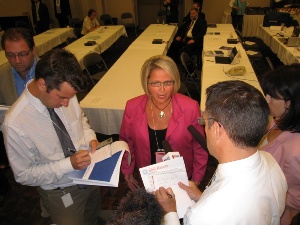

The Hospital Employees’ Union secretary-business manager Judy Darcy says that’s bad news for families who are facing economic uncertainty and need to know that health care and other vital public services are there for them.
Darcy notes that in addition to service cuts, British Columbians will face more than $100 million in MSP premium increases on top of the HST. Health authorities will also be forced to absorb the impact of increased MSP premiums on their payroll costs out of budgets that are already stretched to the limit.
“Once again, this government is sacrificing sound planning and innovative long-term solutions in health care on the altar of quick fixes,” says Darcy. “Many of these cuts will result in more expensive and unnecessary interventions in hospital emergency rooms in the long run.”
Darcy also says that today’s budget sends a confusing and contradictory signal to health care workers who are already being asked to do more with less.
“The finance minister has painted a rosy picture of “a new decade of growth and prosperity” in B.C. But the message to health care workers and the public sector is all doom and gloom.
“The government has acknowledged the need to rejuvenate the workforce, yet they have confirmed their wage freeze on the public sector. Frankly, I think government will be forced to balance its fiscal situation against the very real challenge of recruiting and retaining skilled, experienced health care workers,” says Darcy.
Many HEU members - Licensed Practical Nurses, for instance – have seen their wages slip behind rates in Alberta and other provinces. Their wages have also not kept pace with increased training and expanded responsibilities.
“We’ll be working hard at the bargaining table and in other venues to make sure the public continues to have access to the skilled health care workers that we represent.